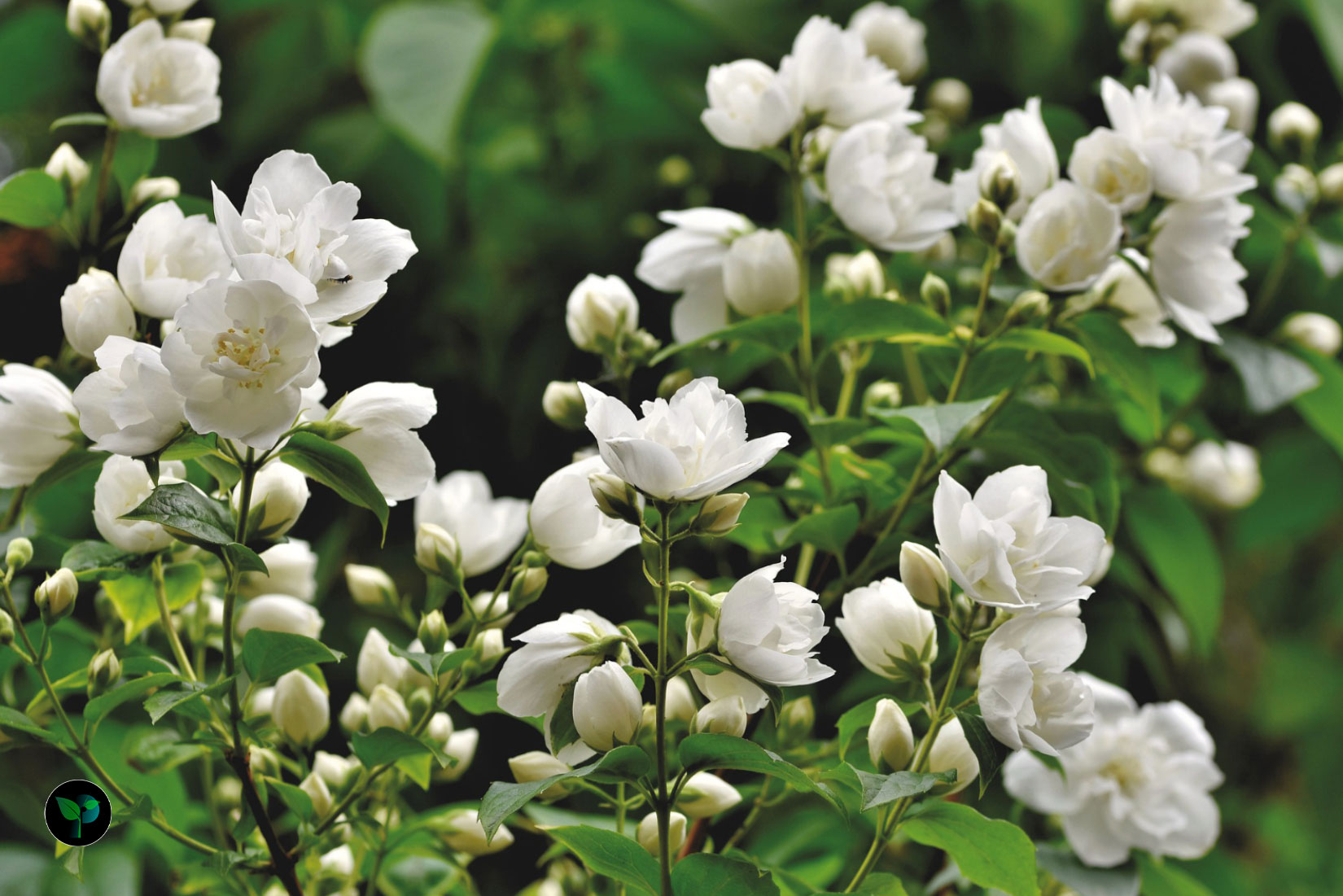Hey there plant enthusiasts and nature lovers! Today, we’ve got something truly special blooming in our digital garden — a spotlight on the timeless beauty and multifaceted charm of the Mogra plant, also known as Arabian Jasmine! In our latest post, we’re diving deep into the enchanting world of Mogra, exploring its rich cultural significance, myriad benefits, and the wondrous ways in which it enchants both body and soul. From aromatherapy wonders to skincare secrets, Mogra is a botanical treasure trove waiting to be explored.
The Mogra plant, also known as Arabian jasmine ( Jasminum sambac), is a species of jasmine native to tropical Asia, from the Indian subcontinent to Southeast Asia. It is cultivated in many places, especially in West Asia, South Asia, and Southeast Asia.
How is the Mogra’s appearance?
The mogra plant is a beautiful shrub with dark green foliage that can grow anywhere from 1.6 to 9.8 feet (0.5 to 3 meters) tall. Here’s a breakdown of its appearance:

Leaves
This plant has glossy, dark green leaves that are typically oval-shaped with pointed tips. They grow opposite each other on the stems.
Flowers
The star of the show! it is known for its beautiful white flowers, although some varieties can have a slight yellow tinge. The flowers are small and star-shaped, with 6 to 9 petals. They grow in clusters of 3 to 12 and have a strong, sweet fragrance.
Habit
These plants can grow as either shrubs or climbers. This means they can either grow upright and bushy, or they can be trained to climb on trellises or other structures.
What are Mogra plant benefits?
It is not only a beautiful flowering plant but also has a wide range of benefits. Here are some key ones:
Aromatherapy
These flowers have a sweet, exotic fragrance that is commonly used in aromatherapy to relax the mind and reduce stress. Inhaling the scent of Mogra flowers can promote a sense of calm and well-being.
Medicinal Uses
Anti-inflammatory properties: It is often used in traditional medicine for treating inflammation and soothing skin irritations.
Antioxidant properties: The flower contains antioxidants that help in fighting free radicals and reduce oxidative stress in the body.
Antiseptic properties: Its extracts have antiseptic properties that can help in treating wounds and preventing infections.
Analgesic properties: Some studies suggest that its oil can help in reducing pain when used topically.
Skincare With Mogra
Moisturizing: Mogra oil is known for its moisturizing properties, making it beneficial for dry skin.
Anti-aging: The antioxidants present in these flowers can help in reducing signs of premature aging, like wrinkles and fine lines.
Skin brightening: Mogra extracts are sometimes used in skincare products for their skin-brightening effects.
Haircare
Hair growth: Mogra oil can promote hair growth and strengthen hair follicles.
Scalp health: The antifungal properties of this plant can help in maintaining a healthy scalp and preventing dandruff.
Cultural and Spiritual Significance
These flowers hold cultural and spiritual significance in many regions. They are often used in religious ceremonies, weddings, and festivals for their scent and beauty. Isn’t it amazing how a simple flower like Mogra can offer so many benefits? If you’re a fan of aromatherapy or natural skincare, incorporating this plant into your routine could be a lovely idea.
Who should not use Mogra?
Arabian Jasmine, is generally safe for most people, but there are certain precautions and considerations to keep in mind:
Allergies
Floral allergies: Individuals with known allergies to flowers, especially jasmine or other flowering plants, may experience allergic reactions to Arabian Jasmine. It’s always advisable to do a patch test before using Mogra products extensively.
Pregnancy and Breastfeeding
Use caution: Pregnant or breastfeeding individuals should consult with a healthcare provider before using its essential oil or products. While Mogra is generally considered safe, it’s best to err on the side of caution during these sensitive times.
Medical Conditions
Sensitive skin: People with extremely sensitive skin may experience irritation from Mogra oil or products. Diluting essential oils like this plant before use can help reduce the risk of skin reactions.
Existing medical conditions: If you have any existing skin conditions, allergies, or medical issues, it’s advisable to consult with a healthcare professional before using its products.
Medication Interactions
Consult with a professional: Individuals taking medications, especially those with skin applications, should consult with a healthcare provider or dermatologist before using Mogra products. There may be potential interactions that need to be considered.
Children and Pets
Caution with children and pets: While it is generally safe, extra caution is advised when using essential oils or products containing Mogra around children or pets. Always ensure proper dilution and supervision.
Essential Oil Use
Use with care: When using its essential oil, always follow recommended dilution guidelines to avoid skin irritation or sensitization.
By being aware of these considerations and taking necessary precautions, most people can enjoy the benefits of Mogra without any issues. If you’re uncertain or have specific concerns, it’s best to consult with a healthcare provider or an aromatherapist for personalized advice.



Leave a Reply